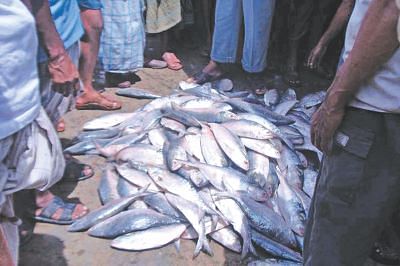<i>Hilsa still remains out of reach of common people</i>

The price of popular fish hilsa is yet to come down as expected, following the ban on export, due to increased demand ahead of the Eid festival.
The government on July 31 banned export of all kinds of raw fishes except shrimp during the month of Ramadan to ensure adequate supply to the local market and keep the prices at tolerable level.
Hilsa supply became abundant following its huge netting at different fishing points of the estuaries and coastal fishing zones in the first week of last month while imposition of ban on its export contributed to decrease in its price.
But the price again rose by 10 percent compared to that of last week, said Aslam Khan, manager of hilsa trading house Five Star.
Increased demands due to Eid festival amid shortage of supply caused the price hike, said hilsa trader Yunus Ali.
Now hilsa weighing 600 grams is selling at Tk 500-600 per kg, hilsa weighing 800-900 grams at Tk 800-900 per kg while the fish weighing 1,000 grams or over is priced at 1,000-1500 per kg.
The prices were Tk 1100, Tk 1600 and Tk 2500-3000 per kg last month.
Only solvent people are now buying hilsa as a medium-sized hilsa costs Tk 800 to 1000, said Sentu Mia, a retail hilsa trader at the market.
"Several factors including demand, supply, investment, costing, profit, purchasing capacity of consumers determine the price of hilsa. Only ban on export cannot bring any sustainable solution to control the hilsa price in the local market as only 10-15 percent of netted 3,50,000 tonnes of hilsa is exported yearly," local hilsa trader Yunus Ali said.
The amount of hilsa netting reduced in the second week of this month, fishermen said, adding that the catches depend on the flow of current in river and sea, amount of rainfall and periods of lunar calendar, such as full and new moons.
In last week, 20-30 fishing trawlers, each carrying 150-200 maunds of hilsa, daily reached Barisal fishing port from the estuary and coastal areas but now the number has come down to 10-15, said Kalam, a worker engaged in unloading hilsa at the port.
The ban on hilsa export is likely to be withdrawn after Ramadan, said AKM Nur Muhammad, manager of Barisal Fish Landing Centre under Bangladesh Fisheries Development Corporation.

 For all latest news, follow The Daily Star's Google News channel.
For all latest news, follow The Daily Star's Google News channel. 



Comments